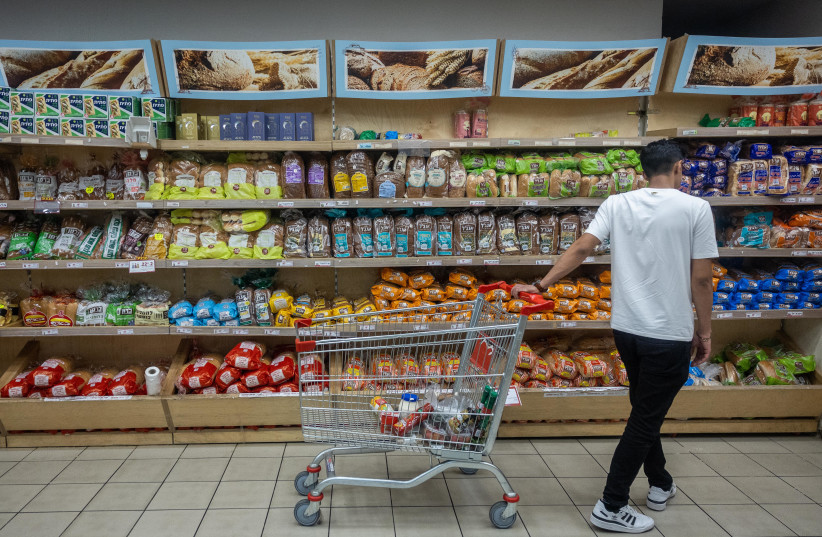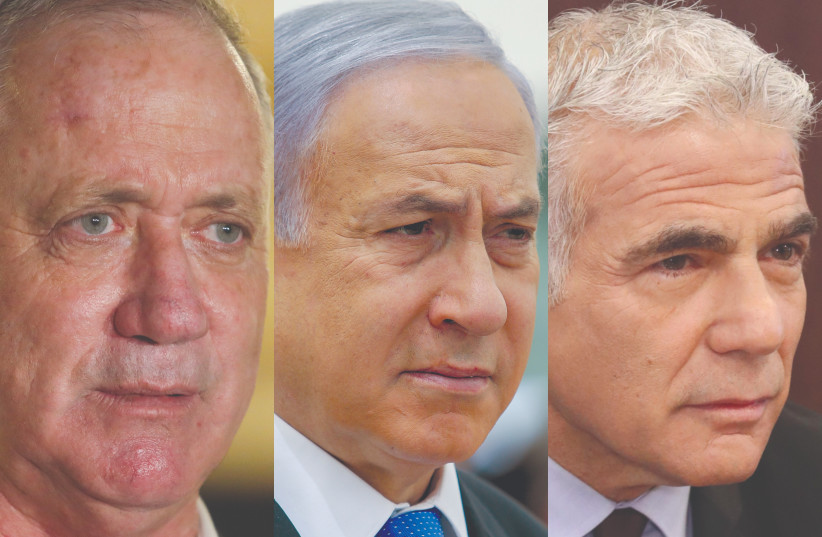With 96 days left until the election, the current campaign feels distinctly like the last one, and the one before that, and the one before that, and the one before that going back to the first election of this current five-election cycle in April 2019.
It feels the same because, at this early point in the campaign, the predominant issue remains the same: Benjamin Netanyahu.
Turn on the television or radio and listen to an interview with various party leaders and MKs and one of the first issues that inevitably comes up is whether their party will be willing to sit in a government with Netanyahu.
Six years since the police investigations into Netanyahu began, three years since he was formally indicted, two years since his trial began, and the main issue of this campaign at this stage − as it was during the previous four campaigns − remains Netanyahu, whether he is suited to be prime minister, and whether others will sit in a coalition either under him or even with him as a partner.
Gantz: Been there, done that
Blue and White-New Hope head Benny Gantz declared during a spate of interviews this week that he will not be willing to sit with Netanyahu. That he felt the need to spell this out indicates that he believes this is something that the voters want to know and will impact their vote.
Gantz’s Answer: No, been there, done that, and it didn’t work out well. Gantz, it should be recalled, joined a coalition with Netanyahu in 2020 based on an agreed rotation, one which Netanyahu foiled, leading to the collapse of the government and a fourth election.

But that Gantz feels that this is the issue prospective voters want to hear is in itself telling. Not his position on a two-state solution, not his thinking on religion-state issues, not on his ideas about how to bring down housing prices, improve the country’s infrastructure and tackle the spiraling cost of living. Rather, once again, Netanyahu.
And he is not alone. Yisrael Beiteinu head Avigdor Liberman has already ruled out sitting with Netanyahu, and this will be one of the major question marks surrounding the merger that Ayelet Shaked and Yoaz Hendel announced Wednesday night: will this party, or will it not, be willing to sit with a Netanyahu-led Likud
Israeli politics and socio-economic issues
With gas prices through the ceiling, the price of basic food items on the rise, the cost of electricity prohibitively high, and municipal taxes going up, one could be excused for thinking that these would be the main issues that the parties would want to discuss before the upcoming election. But it is not. It all still has to do with Netanyahu’s suitability.
The conventional wisdom has long held that the reason that Israeli elections seldom revolve around socio-economic issues is that the population is too concerned with life-and-death issues − Iran, the Palestinians, Hezbollah − to deal with the bread and butter issues that impact people’s daily lives. As that old saying goes: first secure life, and then deal with quality of life.
Recent polling, however, shows that this assumption is not necessarily true. An Israeli Democracy Institute poll following the April 2019 elections showed that socio-economic issues were the main consideration for nearly a quarter of the voters in determining who to vote for, more than any other issue, including a party’s position on foreign and defense issues.
And that was at a time when the economy was humming along nicely, before the coronavirus pandemic and all its accompanying economic problems.
It’s not that the Israelis don’t care about economic issues, or are apathetic to them, it is rather that the parties do not make them the centerpieces of their campaigns, and do not place in stark terms the economic alternatives they propose, as opposed to the ones proposed by rival parties.
In none of Israel’s elections has there ever emerged a James Carville, the legendary strategist behind Bill Clinton’s victory in the 1992 elections. It was during that election that Carville pinned to the wall of Clinton’s campaign headquarters in Little Rock, Arkansas, the now iconic phrase, “The economy, stupid.” This was meant to remind the campaign staff to keep on message about the economy and to hammer this issue day in and day out.
Israel has not had an election for a generation where the economy was the central issue for one of the major parties. It’s not that economic issues are not as important here as they are anywhere else in the world, but rather it is that the parties do not make this a major issue in the campaign, nor use it to separate themselves from their rivals.

And one reason for this may be that the economic policies of the major rival parties are not that different from one another. How do Likud’s economic policies differ from those of Gantz’s party or even Yair Lapid’s Yesh Atid?
On security and foreign policy issues as well, the differences between the parties are pretty small right now. All the major parties are opposed to a nuclear Iran, support the Abraham Accords, have similar policies regarding Gaza, and believe that since a two-state solution is not in the immediate offing, why discuss it.
One reason that Netanyahu has been the issue over the last four campaigns is that parties can clearly say whether they are for him (Likud, United Torah Judaism, Shas, the Religious Zionist party), or against him (all the rest). The choices are clear.
The parties are all currently scratching their heads trying to figure out how to move voters from one block − the pro- or anti-Netanyahu bloc − to the other. They are trying to figure out what might compel a Likud voter, for instance, to vote for Gantz’s party, or vice versa.
They would be wise to turn to economic issues − perhaps these could bring differences between the parties into focus. But for that, detailed economic plans would have to be proposed, something the parties have not done in the past, believing the public is not that interested.
But the opposite is the case. The public is interested, it is the parties that have not pounded on this issue. And, in the early days of this campaign, that pattern − despite skyrocketing prices − is repeating itself. Rather than hammering on the economy, the parties continue to hammer on the Netanyahu issue …. again, and again, and again.
After four elections, maybe it’s time for someone to switch the channel from all-Netanyahu-all-the-time to an economic one.
